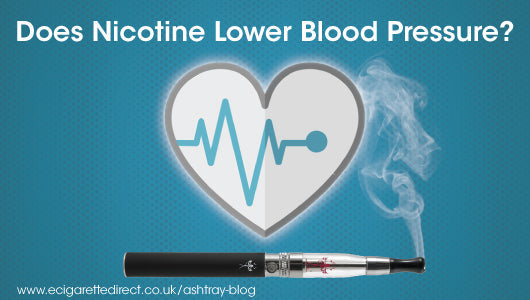
Could Vaping Reduce Your Blood Pressure?
Like many other vapers, I've always thought that both smoking and nicotine lead to an increase in our blood pressure.
After all, nicotine constricts our blood vessels, making it harder for the heart to pump blood around our veins.
And many health sites offer advice like:
After two hours without a cigarette, your heart rate and blood pressure will have decreased to near normal levels.
Source: Healthline
Yet other sites advise that smoking doesn't cause your blood pressure to rise.
For example, the NHS says:
Smoking doesn't directly cause high blood pressure but it puts you at much higher risk of a heart attack and stroke.
Source: NHS UK
So what's going on?
It turns out that both source may be right.
Temporary Effects of Smoking and Nicotine on Blood Pressure
Unfortunately, most studies have focused on the effects of smoking on blood pressure rather than on nicotine alone (although, as I explain at the end of this post, more studies are on their way).
So although we're interested in nicotine and vaping, to get any idea of whether nicotine negatively affects blood pressure we're going to have to look at smoking.
It turns out that smoking does lead to a temporary increase in blood pressure - Dr Farsalinos estimates that this lasts for about 15 minutes.
But the effects on long term blood pressure are more controversial.
Long Term Effects of Smoking on Blood Pressure
In a four year study of over 8,000 steel workers, Duk Heel et Al found that quitting smoking can lead to an increase in blood pressure or hypertension - or both. They also found that increases in blood pressure among non-smokers (as well as quitters) was higher than in current smokers.
A separate study found that while smoking is accepted as incredibly bad for both mother and foetus, nicotine actually protects against pregnancy-induced hypertension, a leading cause of death in both pregnant women and their foetuses. This is probably due to the anti-inflammatory effects of nicotine. (Note: The methodology of this study involved placentas and not pregnant smokers.)
Take smoking out of the equation, and some scientists start to get enthusiastic about nicotine.
Dr Newhouse, who had been researching the effect of nicotine on Alzheimers and Parkinsons disease, stated:
In our studies we find it actually reduces blood pressure chronically. And there were no addiction or withdrawal problems, and nobody started smoking cigarettes.
Source: Study finds nicotine safe, helps in Parkinsons, Alzheimers
(Newhouse is controversial, as he believes the risk of addiction to nicotine on its own is virtually zero. Some evidence backs him up, as we've pointed out here.)
Different Effects on Short Term and Long Term Blood Pressure
Part of the controversy may be due to the different effects of nicotine in the short and long term.
A study by Bolinder. G. and de Faire. U found that both smoking and smokeless tobacco lead to an increase in blood pressure and heart rates during normal activity, which appeared to be due to nicotine. However, clinical measurements found a lower rate of blood pressure.
Meanwhile, Primesta et al argue that the lower blood pressure found in smokers can be attributed to measurements taken in office hours, where workers do not usually smoke. They concluded that smoking had little effect on blood pressure.
How's this possible? Pickering et al believe that smokers may develop a tolerance to the effects of smoking on blood pressure, meaning the temporary effects on blood pressure are not permanent.
Controversy
Despite the studies quoted here, the effects of nicotine on blood pressure remain controversial.
Many studies that conclude smokers have a lower blood pressure are regarded as a paradox, because nicotine has sympathomimetic and vasoconstriction effects which should result in higher blood pressure and increased heart rate.
Dr Farsalinos told us:
There is some controversy in this area. First of all, all studies refer to smoking and not nicotine. Nicotine has immediate effects on blood pressure (acute elevation, lasting for about 15 minutes). But smoking has been associated (in some studies) with lower blood pressure.
Moreover, some studies have shown that smoking cessation leads to elevated blood pressure. This is probably attributed to weight gain commonly observed after smoking cessation. On the other side, there are some other studies showing opposite findings.
The consensus right now is that smoking is not a risk factor for developing hypertension, however, hypertensives who also smoke have much higher risk for developing heart disease compared to hypertensive non-smokers.
Dr Farsalinos is currently planning a study which will assess the long term effects of switching from smoking to vaping on blood pressure. Hopefully, that will give us a clearer picture for the future!
Reading
For those of you with an in-depth interest in this topic, here's a list of further reading:
- Effects of Nicotine: CASAA.org
- Effects of Nicotine on Pregnancy Induced Hypertension: Dowling et al
- Effects of Smoking Cessation on Changes in Blood Pressure and Incidence of Hypertension Duk-Heel et al
- Ambulatory 24-h Blood Pressure Monitoring in Healthy, Middle-Aged Smokeless Tobacco Users, Smokers, and Nontobacco Users: Bolinder. G. and de Faire
- Association Between Blood Pressure and Smoking: Primatesta. P. et al.
- Cardiovascular Toxicity of Nicotine: Implications for Nicotine Replacement Therapy: Benowitz. N. L and Gourlay
- The Effects of Smoking and Nicotine Replacement Therapy on Blood Pressure Pickering et al